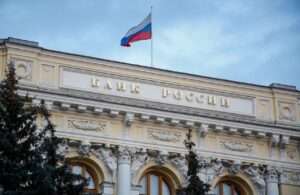The Volokh Conspiracy
Mostly law professors | Sometimes contrarian | Often libertarian | Always independent
House Passes REPO Act Giving President Authority to Confiscate Russian Government Assets in the US and Transfer them to Ukraine
It's a good idea that will hopefully be imitiated by our allies.

In addition to finally passing long-delayed and much-needed military assistance to Ukraine, the House of Representatives today also enacted the REPO Act. That law gives the president the authority to confiscate $6 billion in Russian government assets currently frozen in the United States, and transfer them to Ukraine, in order to assist that country in resisting Russia's brutal war of aggression.
The Senate will almost certainly pass the REPO Act, as well, and President Biden seems certain to sign it and act on it. While $6 billion isn't all that much relative to the costs of the war, hopefully this US action will incentivize our European allies to confiscate the nearly $300 billion in Russian state assets currently frozen under their jurisdiction.
I have long advocated this idea, which is overdue. In a November post, I outlined the case for it, and addressed a number of objections, including claims that confiscation would violate the Takings Clause of the Fifth Amendment, sovereign immunity arguments, arguments that confiscation is unfair to the people of Russia, and fears that it would set a bad precedent deterring foreign investment in the US.
Here's an excerpt:
There is a staggering $300 billion in frozen Russian state assets located in Western nations backing Ukraine…. To put this figure in perspective, it's worth noting that the total amount of US aid to Ukraine from February 2022 through July 31, 2023 was about $77 billion. The European Union, individual European states, and Canada, gave approximately $165 billion during the same period…. The $300 billion in frozen assets is equal to some two years of total Western assistance to Ukraine at the current pace of spending!…
[I]n the US the private property of foreigners is protected against confiscation by the Takings Clause of the Fifth Amendment, which requires the government to pay "just compensation" if it takes "private property." Most European nations have similar constitutional protections for private property rights, as does the European Convention on Human Rights.
But the Fifth Amendment and its European analogues do not offer the same kind of blanket protection to the property of foreign governments. This distinction undermines claims by some critics that uncompensated seizure of Russian state assets would violate the Takings Clause and similar constitutional guarantees in Europe. It also mitigates concerns that confiscating Russian government assets would create a dangerous slippery slope. Private property rights of foreigners would remain protected by constitutional guarantees….
Oona Hathaway argues that confiscating Russian state assets would violate sovereign immunity. I think the Tribe report offers compelling responses to this argument (pp 60-64).
In addition, I am not convinced that sovereign immunity is actually a just principle that we have a duty to obey. It is in fact a perversion of justice, enabling rulers to escape accountability for violating human rights and other injustices they perpetrate. It was a mistake to read it into the US Constitution. It is equally a mistake to allow it to be a principle of international law. Some laws are so deeply unjust that we have no duty to obey them. The law of sovereign immunity is one such case.
At the very least, sovereign immunity should not be permitted to shield authoritarian states like Putin's regime from having their assets confiscated in order to combat their wars of aggression, mass murder of civilians, and other large-scale human rights violations. Such rulers no more deserve sovereign immunity than Mafia bosses….


Show Comments (109)